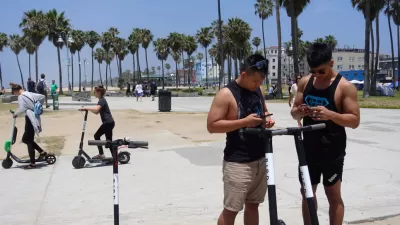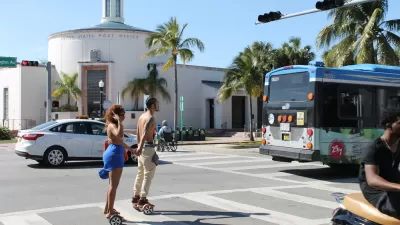The narrative of electric scooter users as affluent, entitled, and "tech bro-y" does not reflect the demographics of fans of the new mobility technology, according to a new study. Electric scooters are actually very popular.

A new study finds that electric scooter users are far less affluent and "tech bro-y" than the hysteria surrounding the new mobility service might make people think, according to an article by Aarian Marshall.
Regina Clewlow, "a longtime transportation planner whose new data-crunching startup Populus wrote the report," explains the significance of the study in a soundbite quoted in the article: "You see a lot in the news about electric scooters and cities’ concerns around visual clutter….It has become a narrative, but it’s not supported by facts."
Marshall explains one of the key findings:
The study, which surveyed 7,000-person in 10 cities, found that over half the population in every place studied had a “positive opinion” of scooters in the period between May and July of this year. In some cities—Atlanta, Austin, Denver, Chicago, Washington, DC, and Los Angeles–over 70 percent of residents feel good about scooters. (In San Francisco, though, only 52 percent of respondents supported the things, which might explain all the feces.
And here's another finding that might explain the backlash against the new mobility option:
Among income brackets, those making between $25,000 to $50,000 a year are the most into the idea, and those making above $200,000 are the least. (One theory, from UC Berkeley transportation researcher Susan Shaheen: lower income urbanites who can’t afford cars appreciate the mobility of scooters, and wealthier residents who do drive find them a street-clogging nuisance.)
Electric scooter share companies, like Lime and Bird, seem aware of the potential for their service to appeal to low-income residents of urban areas, and have begun offering discounted access to scooters for qualifying riders.
Women also report a higher opinion of electric scooters than men. Marshall includes more insight, and more research, into why women might be more willing to ride electric scooters than bikes. Finally the story concludes a discussion about what it might take to build infrastructure that serves the need of all users, including an emergent constituency of people who love electric scooters.
FULL STORY: Not Just Tech Bros: E-Scooter Fans Are Surprisingly Diverse

Alabama: Trump Terminates Settlements for Black Communities Harmed By Raw Sewage
Trump deemed the landmark civil rights agreement “illegal DEI and environmental justice policy.”

Study: Maui’s Plan to Convert Vacation Rentals to Long-Term Housing Could Cause Nearly $1 Billion Economic Loss
The plan would reduce visitor accommodation by 25% resulting in 1,900 jobs lost.

Why Should We Subsidize Public Transportation?
Many public transit agencies face financial stress due to rising costs, declining fare revenue, and declining subsidies. Transit advocates must provide a strong business case for increasing public transit funding.

Wind Energy on the Rise Despite Federal Policy Reversal
The Trump administration is revoking federal support for renewable energy, but demand for new projects continues unabated.

Passengers Flock to Caltrain After Electrification
The new electric trains are running faster and more reliably, leading to strong ridership growth on the Bay Area rail system.

Texas Churches Rally Behind ‘Yes in God’s Back Yard’ Legislation
Religious leaders want the state to reduce zoning regulations to streamline leasing church-owned land to housing developers.
Urban Design for Planners 1: Software Tools
This six-course series explores essential urban design concepts using open source software and equips planners with the tools they need to participate fully in the urban design process.
Planning for Universal Design
Learn the tools for implementing Universal Design in planning regulations.
Caltrans
Smith Gee Studio
Institute for Housing and Urban Development Studies (IHS)
City of Grandview
Harvard GSD Executive Education
Toledo-Lucas County Plan Commissions
Salt Lake City
NYU Wagner Graduate School of Public Service





























